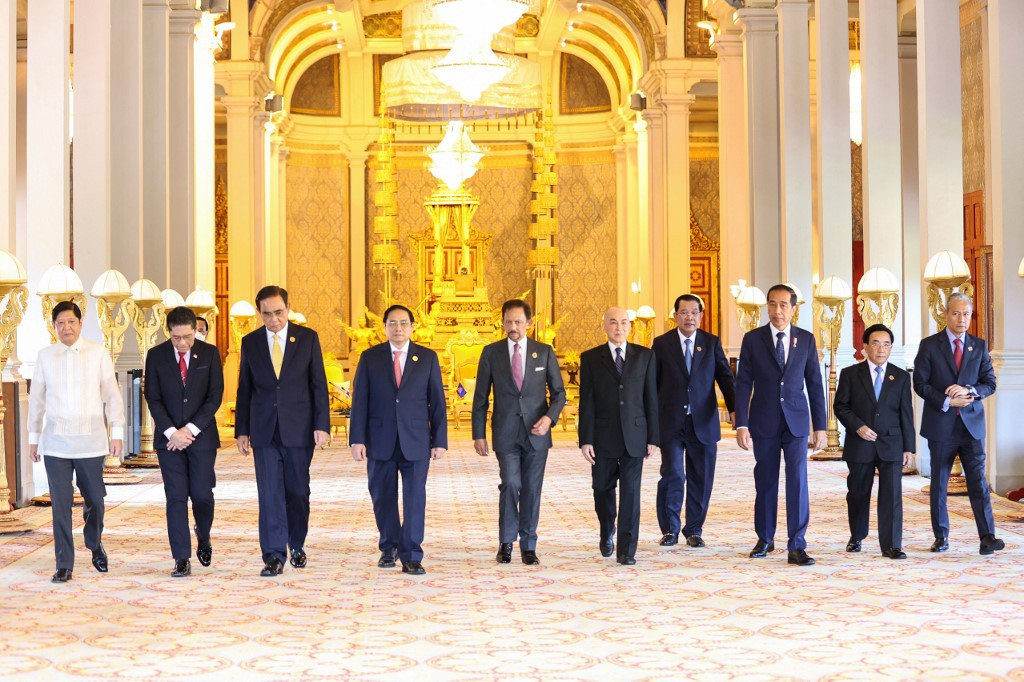Popular Reads
Top Results
Can't find what you're looking for?
View all search resultsPopular Reads
Top Results
Can't find what you're looking for?
View all search resultsIndonesia’s chairmanship and ASEAN’s challenges in 2023
As the chair, Indonesia must continuously emphasize ASEAN’s strategic interests that the grouping does not want either pax-Americana nor a pax-Sinica in the region.
Change text size
Gift Premium Articles
to Anyone
O
n Jan. 1, Indonesia officially began its chairmanship of ASEAN for 2023. The last time Indonesia held that position was in 2011, in a swap with Brunei Darussalam, which then chaired ASEAN in 2013.
Back in 2011, Indonesia chaired ASEAN with the agenda of moving the grouping’s agenda one step further: From regional community-building into building a confident and coherent ASEAN that plays a greater role in the community of nations.
Moreover, 2011 was a year when ASEAN was poised to make progress after the adoption of the ASEAN Charter in 2008. Despite the border dispute between Thailand and Cambodia, which was successfully managed, Indonesia’s chairmanship in 2011 concluded with the adoption of the Bali Concord III. ASEAN was on its way to playing a role as a global actor that not only provides regional security, but also contributes to global stability.
The situation in 2023, however, is very different from 2011. ASEAN is now presented with several great challenges and problems that risk undermining the regional bloc’s most fundamental qualities: Relevance, unity and centrality. Those challenges will require ASEAN as an institution, regardless of who the chair is, to work closely to address them in a collective manner.
The first challenge is how to navigate the strategic rivalry between the United States and China. ASEAN will continue to grapple with the necessity to maintain its strategic autonomy while not getting drawn into taking sides in great-power politics.
As the chair, Indonesia must continuously emphasize ASEAN’s strategic interests, which are that the grouping wants neither a pax-Americana nor a pax-Sinica in the region. While extra-regional powers might want to advance their own visions of a regional order, ASEAN should continue advocating that it prefers a regional order based on the ASEAN Outlook on Indo-Pacific (AOIP). The key task for Indonesia’s chairmanship on this challenge is to ensure the operationalization of the AOIP.
The second challenge is the imperative of accelerating post-pandemic economic recovery amid the deterioration of global politics. The economic impacts of the COVID-19 pandemic have been devastating to many countries. The road to recovery will be long and even difficult for many. Yet, that road is now obstructed by Russia’s invasion of Ukraine, inflicting more severe damage on the global economy.
This is the central reason why under Indonesia’s chairmanship, just as during its Group of 20 presidency, Jakarta wants a focus on economic recovery, as reflected in the aspiration to see ASEAN return as “the epicenter of growth”. Indonesia, with all its own problems domestically, must show that it too can be useful for ASEAN in the economic area, not merely in political-security areas.
The third challenge is to ensure that Southeast Asia remains a region where cooperation prevails over conflict. This requires the management of potential hotspots, and the management of the South China Sea dispute is very high on the agenda. This issue will continue to affect and hold back China’s relations with ASEAN.
Unfortunately, it is hard to contemplate other platforms agreeable to all to address this issue other than the early conclusion of the Code of Conduct on the South China Sea (CoC). Therefore, it remains to be seen if Indonesia can capitalize on the close personal relationship between President Joko “Jokowi” Widodo and President Xi Jinping as the basis for getting significant progress on the CoC.
The fourth challenge, or problem to be precise, is the Myanmar question. Since the coup in February 2021, there has been no progress on the resolution of this problem. The junta remains defiant of ASEAN’s five-point consensus (5PC) and continues to wreak havoc against its own people and country.
As the chair, Indonesia’s Foreign Minister Retno LP Marsudi has reiterated that Jakarta will continue to work on the basis of the 5PC. However, given the experience of the previous two chairs, Brunei and Cambodia, Indonesia needs to find new and creative ways to approach this problem without discarding the 5PC. The Myanmar problem, if not resolved, will continue to derail ASEAN’s community-building process.
The fifth challenge is to continue the ongoing efforts to strengthen ASEAN’s capacity and institutional effectiveness. Threats to ASEAN’s relevance, unity and centrality will intensify if ASEAN cannot withstand all the challenges mentioned above. ASEAN is aware of this problem and, upon Indonesia’s suggestion, has started to examine how it can strengthen its capacity and institutional effectiveness.
Officials have submitted recommendations to the leaders on how to undertake that task. Now, it will fall on Indonesia as the chair to coordinate the efforts to follow up the recommendations.
Those are not easy challenges to deal with, and all are equally of paramount importance for ASEAN to address. Therefore, it is unfortunate that international attention has only been disproportionately given to the question of Myanmar. The international community, including some within ASEAN, have high expectations of Indonesia’s chairmanship in resolving the Myanmar problem. Indonesia, by working closely with all ASEAN members, should of course try to deliver.
However, it is also equally important to ensure that Indonesia’s chairmanship is not a single-issue chairmanship. The Myanmar problem should never be allowed to distract Indonesia and ASEAN from addressing other challenges.
***
The writer is a senior fellow, Centre for Strategic and International Studies, Jakarta.










